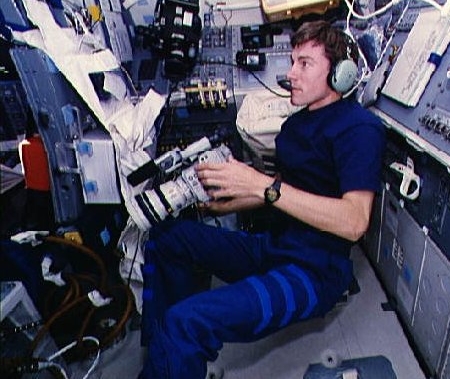Important Roscosmos official endorses continuing cooperation with US in space
In a clear sign of the distinct change in atmosphere since the removal of Dmitry Rogozin as head of Roscosmos, the executive director of human space flight programs at Roscosmos, Sergei Krikalev, yesterday endorsed the longstanding cooperation between the U.S. and Russia in space.
Krikalev’s comments came after the launch yesterday of Endurance with one Russian astronaut as part of its four-person crew.
At a briefing after the Oct. 5 launch of the Crew-5 mission from the Kennedy Space Center, Sergei Krikalev, executive director of human space flight programs at Roscosmos, emphasized long-running cooperation between the United States and Russia in civil space, cooperation that has been strained since Russia’s invasion of Ukraine in February.
“We just continue what we started many years ago in 1975 when the Apollo-Soyuz crew worked together, and now we continue our cooperation,” he said after mentioning a “new phase of cooperation” with the exchange of seats between NASA and Roscosmos.
To understand the importance of Krikalev’s comments, you must also understand the context. First, Krikalev is a very significant figure in the history of Russia. He was called the last Soviet citizen, having been stranded on Mir an extra few months when the Soviet Union fell in 1991. Then he was the first Russian to fly on the shuttle, followed later by being on the first mission to ISS, when it was only two modules.
Since his retirement as an active astronaut, he has become the man in charge of Russia’s manned program, where he clashed with Rogozin several times over policy. His opposition to Rogozin almost certainly was a factor in Rogozin’s removal.
Krikalev’s endorsement of continuing the U.S-Russian partnership only cements that partnership, especially because Krikalev himself is a dyed-in-the-wool communist at heart. At least, he said so emphatically when I interviewed him at length in 2003 for Leaving Earth. I doubt his mind has changed in this matter, though his relentless honesty as an engineer has probably shaken his dedication to that failed ideology in subsequent years.
Nonetheless, his standing in Russia gives any statement he makes great weight. Expect more efforts by the Russians to ease tensions with the U.S., though their chances of success will be limited as long as Russia is continuing its unprovoked invasion of the Ukraine.
In a clear sign of the distinct change in atmosphere since the removal of Dmitry Rogozin as head of Roscosmos, the executive director of human space flight programs at Roscosmos, Sergei Krikalev, yesterday endorsed the longstanding cooperation between the U.S. and Russia in space.
Krikalev’s comments came after the launch yesterday of Endurance with one Russian astronaut as part of its four-person crew.
At a briefing after the Oct. 5 launch of the Crew-5 mission from the Kennedy Space Center, Sergei Krikalev, executive director of human space flight programs at Roscosmos, emphasized long-running cooperation between the United States and Russia in civil space, cooperation that has been strained since Russia’s invasion of Ukraine in February.
“We just continue what we started many years ago in 1975 when the Apollo-Soyuz crew worked together, and now we continue our cooperation,” he said after mentioning a “new phase of cooperation” with the exchange of seats between NASA and Roscosmos.
To understand the importance of Krikalev’s comments, you must also understand the context. First, Krikalev is a very significant figure in the history of Russia. He was called the last Soviet citizen, having been stranded on Mir an extra few months when the Soviet Union fell in 1991. Then he was the first Russian to fly on the shuttle, followed later by being on the first mission to ISS, when it was only two modules.
Since his retirement as an active astronaut, he has become the man in charge of Russia’s manned program, where he clashed with Rogozin several times over policy. His opposition to Rogozin almost certainly was a factor in Rogozin’s removal.
Krikalev’s endorsement of continuing the U.S-Russian partnership only cements that partnership, especially because Krikalev himself is a dyed-in-the-wool communist at heart. At least, he said so emphatically when I interviewed him at length in 2003 for Leaving Earth. I doubt his mind has changed in this matter, though his relentless honesty as an engineer has probably shaken his dedication to that failed ideology in subsequent years.
Nonetheless, his standing in Russia gives any statement he makes great weight. Expect more efforts by the Russians to ease tensions with the U.S., though their chances of success will be limited as long as Russia is continuing its unprovoked invasion of the Ukraine.

